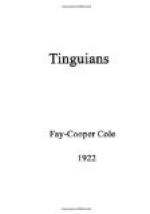The fourteenth day is known as Palay-lay—“the seasoning”—and during the next twenty-four hours the people remain quietly in the village while the bamboo used in the balaua “becomes good.”
Next day is one of great activity. The roofing of the balaua is completed, all necessary repairs are made to the dwelling, for dire results would follow should any part of the house break through during the concluding days of the ceremony. The balance of the day is taken up in dancing and in the construction of the following spirit-houses: the Aligang, Balabago, Talagan, Idasan, Balag, Batog, Alalot, Pangkew and Sogayob (cf. pp. 308-311). Also a little bench is built near the hearth, and on it are placed coconut shell cups and drinks for the use of the Igorot spirits who usually come this night.
The evening of this day is known as Libon—“plenty” or “abundance.” Toward nightfall the mediums, and their helpers enter the dwelling and decorate it in a manner already described for the great ceremonies. Cords cross the room from opposite corners and beneath, where they meet, the medium’s mat is spread. On the cords are hung grasses, flowers, girdles, and wreaths of young coconut leaves. When all is ready, a small pig is brought into the room, while the men play frantically on their gongs and drums. On the medium’s mat are many articles, alangtin leaves, a rooster, a branch filled with young betel-nuts, cooked rice moulded into the form of an alligator, but with a wax head and seeds for eyes, a spear, and a bundle of rice straw. Taking up a dish of water, the medium pours a part of it into the pig’s ear; then, as the animal shakes its head, she again catches it in the dish. Rolling up a mat, she dips it into the water, and with it touches the heads of all members of the family, for in the same manner that the pig has thrown the water out of its ear, so in a like fashion will illness and misfortune be thrown from all the family who have been sprinkled with it. This act finished, the medium dances before the doors and windows, while she waves the chicken, betel-nuts, or other objects taken from the mat.
At her invitation, the host and his wife join her, but previously they have dressed themselves in good garments, and on their heads and at their waists they wear girdles and wreaths of alangtin, or wild grasses. The host is handed a long knife, and is instructed to cut the throat of the pig. His wife takes a rice winnower and a stick, and going to each window strikes the winnower five times, then drops it to the floor, at the same time crying, “Wa-hui.” Next, she strikes a jar of liquor with the winnower, then shakes a coconut shell filled with rice against her abdomen; when finished she is handed a live chicken and again she approaches the jar. Soon she is joined by her husband, armed with a spear and head-axe. As he passes the liquor, he stamps on the ground,




